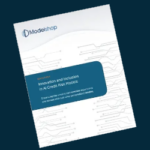A boutique consulting firm we worked with recently was helping a client manage regulatory reporting for their loan portfolio. The client asked them to review their process to help reduce costs and limit regulatory reporting risks. The firm assisted the client in compiling their analysis in spreadsheets and helped meticulously document the process. The client was looking for more. They expected the consulting firm to help them move forward with their digital transformation, not just improve their manual process.
Management consultants create value by developing analytic models for their clients that capture their industry expertise. Even with the popularity of advanced analytical tools, spreadsheets have remained the workhorse used by consulting teams. The dominance of spreadsheets persists for a couple of reasons. First of all, spreadsheets have been designed for financial modeling. Creating revenue projections, cash-flows, or time-series simulations is much easier in a spreadsheet than in a language like Python. Further, these advanced calculations are impossible to do in business intelligence tools. Second, spreadsheets can work with complex data relationships without requiring coding skills. Because historically spreadsheets have just worked, consulting firms haven’t made the technology investment necessary to change the status quo.
Customers are becoming increasingly skeptical of results delivered in spreadsheets.
Digital transformation and the adoption of AI is changing how organizations work with information. Companies are working with more sophisticated data sources, and security concerns have created pressure to move data off desktops. This represents a threat to the value of services delivered using spreadsheets as organizations pull their data into the cloud. Forced to work within enterprise data architectures, consulting teams find they don’t have the same agility they had with spreadsheets. This puts their value at risk.
Intelligent Automation tools are emerging as a powerful alternative to spreadsheets
To meet these new demands, Intelligent Automation tools are growing in popularity as a powerful alternative to spreadsheets. These powerful modeling tools are part spreadsheet, part data modeling tool and part AI. More importantly, these new tools can be deployed in the cloud, including a client’s private cloud. With these tools, consultants have the ability to create models using sensitive client data without it leaving the client’s firewall. Models can be delivered instantly and simply by sharing an online link instead of emailing spreadsheets. Intelligent automation tools can handle more sophisticated data sources, including unstructured data, provide integrated machine learning out of the box. Once a model is created, they can also be published as real-time APIs that drive consistent decisions across the enterprise.
By evolving past the spreadsheet, consulting firms have the power to address entirely new business requirements with their models.
Building “models as a service” represents a powerful new recurring revenue opportunity.
This next generation of modeling tools will give consultants the opportunity to create entirely new recurring revenue streams. By shifting from bespoke analytic services towards delivering analytic applications, consulting teams can establish a portfolio of reusable products. Examples include fraud prevention, economic impact models, regulatory monitoring, corporate performance, or market automation. The advantages go beyond creating a recurring revenue model; consortium models that share data can be more accurate than traditional bespoke models, delivering more value to the client.
Consulting firms are currently being tested by how they respond to their clients’ digital transformations. The democratization of AI technology will only accelerate this trend. Successful consultancies will need to adjust to be more in line with requirements around data complexity, security and real-time analytics. This provides an opportunity for firms to expand their current revenue opportunities to deliver insights and advice through on-demand applications. If successful, consulting firms will reaffirm that they can contribute to the intelligence powering their client’s evolving digital enterprise.







